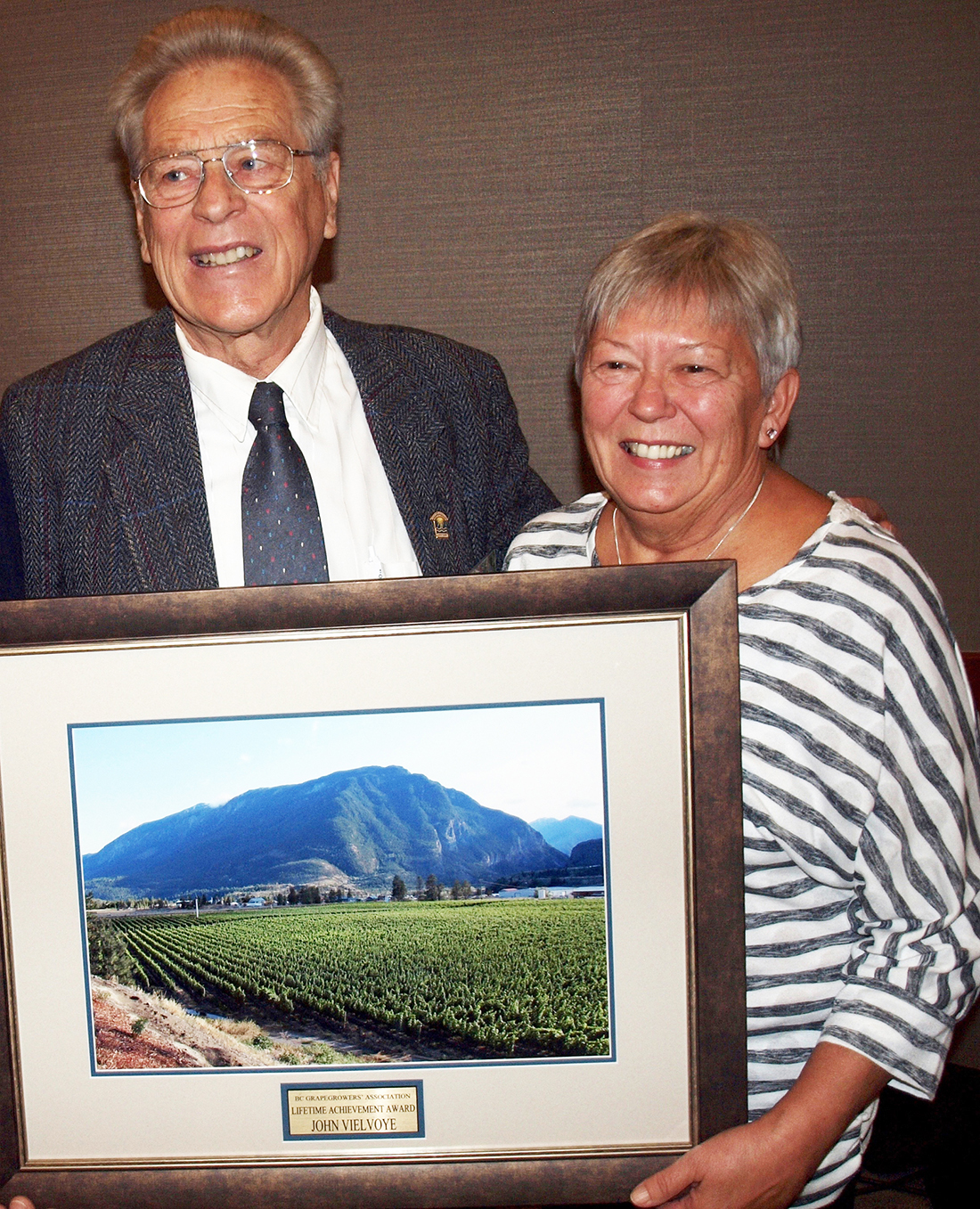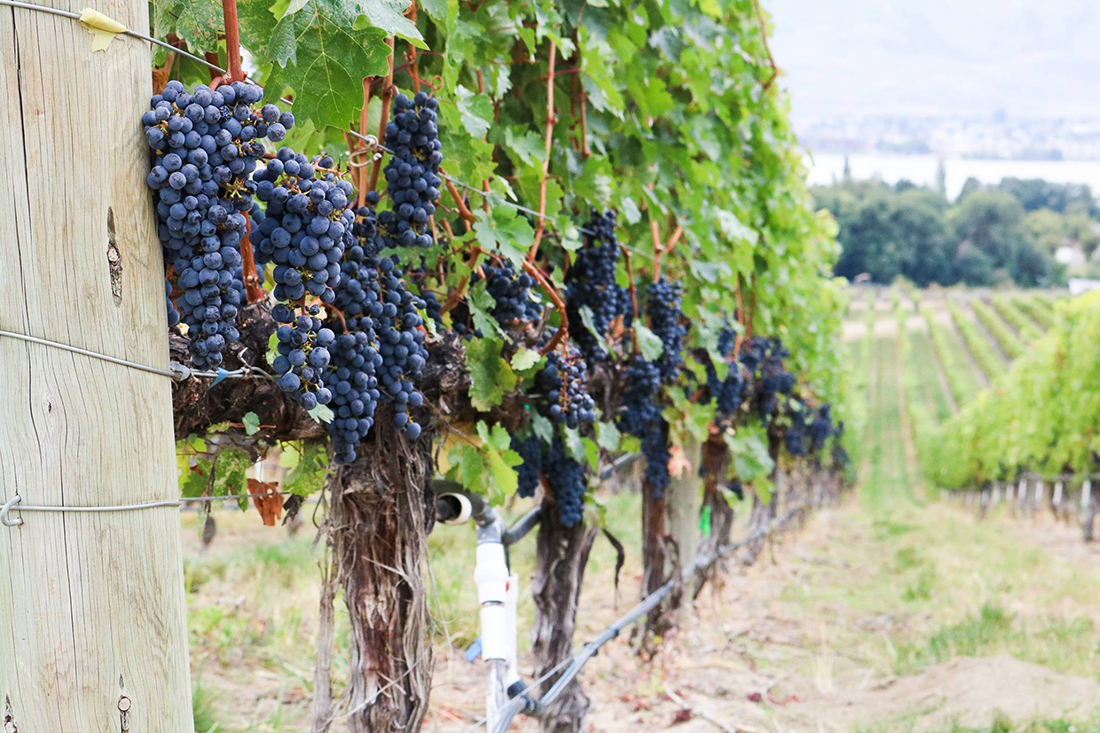KELOWNA – With more than 50 years’ of service to BC’s grape industry, John Vielvoye was critical in helping the BC grape industry navigate key changes while playing a critical role in the development of BC’s modern wine industry as the province’s grape specialist.
Now retired, Vielvoye was honoured in April with the first lifetime achievement award from the BC Grapegrowers’ Association.
Although he’s been retired from the ministry for 20 years or so, Vielvoye continued his industry work as a consultant following retirement.
He was instrumental in helping growers push the boundaries of where wine grapes can be grown in BC from the Okanagan Valley to the Fraser Valley and Vancouver Island and, most recently, Lillooet, the Thompson Valley and the Kootenays.
Vielvoye joined the BC Ministry of Agriculture in 1966 when there were only 1,000 acres of grapes in the province – mostly old table grape varieties such as White Diamond, Campbell Early and Sheridan. These were the varieties the early wineries used to make wine.
The first French hybrids began to appear in BC in the late 1960s, he recalls. Then, from 1977 to 1985, the Becker project experimented with plantings of Vitis vinifera varieties in the Okanagan Valley, trying different growing practices to improve the winter hardiness of the tender vines.
When wineries rather than a grower marketing board began dictating grape prices, growers began paying closer attention to cropping levels and vines began receiving less water, explains Vielvoye. This meant hardier vines that were better able to withstand cold winters.
“Cropping produces different vines,” he said.
Today, growers would be embarrassed to say they produce 10 tons an acre, a yield common back then. Even five is considered high because heavier cropping isn’t conducive to the development of the complex flavours prized in premium wines. Water and fertilizer are used sparingly as well, in order to stress the vines to produce grapes with the concentrated flavour components winemakers seek.
In the 1980s, a new table grape variety bred at the Summerland Research and Development Centre, called Sovereign Coronation, came on the scene. This transformed the table grape sector.
In 1989, with the signing of the Canada-US free trade agreement, a federal wine grape pullout program paid for the removal of lower-quality labrusca varieties and replanting with vinifera.
This was intended to support production of premium domestic wines instead of letting the industry drown rapidly as a flood of high-quality imported wines flowed into the country thanks to free trade.
At the time, there were just 13 wineries in BC. Today, there are 275 grape wineries in the province.
In the years following the subsidized pullout program, grape acreage surged and a number of new varieties began being grown. BC is now home to more than 10,000 acres of vineyards and a premium wine industry that is finding its place on the world stage.
Retrospective
Looking back, Vielvoye admits it’s been satisfying to be part of the industry during those turbulent times, but he says it’s still tough for the small vineyards and wineries.
“Many different skills are required to grow the grapes, make wine and market it; the competition is stiff and the tax structure is complex,” he says.
It’s also difficult for growers trying to make it in parts of the province where winters are more severe than in the Okanagan and South Coast. It doesn’t help that the Vintners’ Quality Alliance program limits the varieties acceptable for certification. Only a couple of hybrid grapes, such as Marechal Foch, are part of that list, but Vielvoye’s opinion is that some hybrids accepted elsewhere produce good wine, too.
Vielvoye’s entry into agriculture was natural. He worked with his family in the ornamental nursery business in Vancouver as a child, and he says he knew early on that he wanted to go into extension work. He graduated from UBC in 1965 and worked with Agriculture Canada for a year before applying to the provincial ministry.
His wife Evelyn was from Kelowna, and they both liked the Okanagan, so when the opportunity to return came up, they didn’t hesitate, never realizing the changes they would be part of.
Overall, he says it gives him a good feeling to look back on the changes in the industry and the many people he’s worked with over the years who were involved in its success.
And, he was especially pleased with his recognition by the industry. While it isn’t often he gets too emotional to speak, he did as he accepted his award at the annual general meeting of the grapegrowers’ association, where members also gave him a standing ovation.
“It was overwhelming to be recognized by growers; I really appreciate it,” he says.
Grape specialist honoured for dedication
John Vielvoye receives lifetime achievement award


 Grapegrowers share sustainability objectives
Grapegrowers share sustainability objectives